|
|
|
Sort Order |
|
|
|
Items / Page
|
|
|
|
|
|
|
| Srl | Item |
| 1 |
ID:
127786
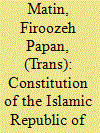

|
|
|
|
|
| Publication |
2014.
|
| Summary/Abstract |
On 3 December 1979, almost one year after Mohammad Reza Shah Pahlavi left Iran, the Constitution of the Islamic Republic of Iran replaced the monarchical constitution of 1906. The new constitution was to guarantee that the monarchy was abolished and the Islamic Republic system of government was enforced in its place. The constitution was to observe the Islamic and the nationalistic aims of the revolution with regard to the demands of a public that came from various social, religious, ethnic, and political backgrounds. Thus the 1979 constitution included differing components, which necessitated the amendments and the modifications that were added to the constitution in 1989. The constitution and its development are subjects that have been discussed in detail by scholars of modern Iran, among whom Asghar Schirazi stands out for his comprehensive study of the constitution. The following translation of the Constitution of the Islamic Republic of Iran highlights the relationship between the 1979 text of the constitution and the 1989 amendments in an attempt to contribute to the ongoing discussions on this subject.
|
|
|
|
|
|
|
|
|
|
|
|
|
|
|
|
| 2 |
ID:
170598
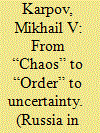

|
|
|
|
|
| Summary/Abstract |
The article describes how social and political changes in post-Soviet Russia over the past quarter of a century have been read and assessed by Chinese experts in relevant fundamental monographs. Each of the monographs considered herein, published in China twelve years apart, reviews different stages in the evolution of Chinese experts’ approach towards Russia, and states their analytical, ideological and political conclusions. Generally speaking, China’s sociopolitical Russian studies have evolved from the ideologically motivated resentment against the Soviet Union’s dissolution, the disbandment of its Communist Party and the ensuing shock reforms of the 1990s to the recognition of irreversible changes in Russia and “legitimization” of the Russian leadership in the 2000s-2010s. However, by the end of the current decade, the topic of uncertainty about Russia’s future sociopolitical and economic development has once again surfaced in some key publications along with increasingly “panegyrical” assessments of the Russian president.
|
|
|
|
|
|
|
|
|
|
|
|
|
|
|
|
| 3 |
ID:
129094
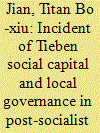

|
|
|
|
|
| Publication |
2014.
|
| Summary/Abstract |
This study makes use of the framework of social capital to explain the post-socialist governance model and characteristics of local governments in contemporary China. The incident of Tieben in April 2004 is selected as an example to explain how the local government developed social capital using informal mechanism and policy networks to facilitate economic development and to enhance government performance. thereby forming the so-called post-socialist local regime. During the incident of Tieben. the local movement collaborated with real estate developers and financial institutions. Farmers were excluded from this plan and their interests were sacri?ced. This study uses the concept of bonding social capital to explain this model. The model worked on the basis of the close relationship between specific groups rather than general trust and ptiblic participation. The majority of relevant sttitlies. on the other hated. show that instead of bonding social capital. bridging social capital is a better means to resolve the conflicts among nunicrous stib-grotips with vested interests. and to facilitate favorable economic and social performance. This paper hence contends that. although a local government may stimulate the development of social capital. the use of this governance model excites the participation and deprives cannot provide a useful guide for optimizing local government performance.
|
|
|
|
|
|
|
|
|
|
|
|
|
|
|
|
| 4 |
ID:
128143


|
|
|
|
|
| Publication |
2014.
|
| Summary/Abstract |
Dynamics of Indian Diaspora in East Africa has been continuous point of attraction for researchers, academicians, policy makers and even general audience. Even a cursory glance reveals that dozens of research has been carried out by scholars and numerous literatures are available on the subject. However, there have been significant changes in the focus of the research. In the colonial period, political activism of Indians in East Africa was a major point contention between colonial power and nationalist leaders which is clearly visible in the writings of CF Andrews (Indian question in East Africa, 1921).
|
|
|
|
|
|
|
|
|
|
|
|
|
|
|
|
| 5 |
ID:
129648
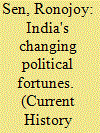

|
|
|
|
|
| Publication |
2014.
|
| Summary/Abstract |
India is due to hold a general election in April- May 2014, and speculation about the shape of the next government in New Delhi has reached a fever pitch. The presence of a new political player-the Common Man's Party (Aam Aadmi Party, or AAP)-has thrown open a contest that was already going to be difficult to call. Election forecasting in India is a perilous task in any case, given the country's diversity and fragmented politics. Nonetheless, certain broad trends can be discerned. One is the parlous state of the country's oldest party, the Indian National Congress. The Congress has been in government during much of independent India's history. For the past decade it has governed the nation as the leader of the United Progressive Alliance (UPA), and its popularity has steadily declined. After the 2014 general election, it is unlikely to be in a position to form a new government.
|
|
|
|
|
|
|
|
|
|
|
|
|
|
|
|
| 6 |
ID:
130192
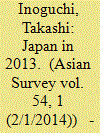

|
|
|
|
|
| Publication |
2014.
|
| Summary/Abstract |
This article describes the ups and downs and complexities of Japanese PrimeMinister Abe Shinzo's ''Abenomics'' and ''Abegeopolitics,'' political approaches designed to revitalize Japan's economy and restore its national pride and strength, respectively.
|
|
|
|
|
|
|
|
|
|
|
|
|
|
|
|
| 7 |
ID:
130206


|
|
|
|
|
| Publication |
2014.
|
| Summary/Abstract |
The political stalemate prevailing in Nepal since the dissolution of the first Constituent Assembly (CA) in 2012 ended with the second CA polls in November. Bhutan's second parliamentary elections in July and the opposition People's Democratic Party's victory over the outgoing Druk Phuensum Tshogpa (Bhutan Peace and Prosperity Party) were signs of consolidation of Bhutan's nascent democracy.
|
|
|
|
|
|
|
|
|
|
|
|
|
|
|
|
| 8 |
ID:
129020


|
|
|
|
|
| Publication |
2014.
|
| Summary/Abstract |
THE KEY INSIGHT EXPRESSED IN THE STRIKING WORDS OF THE BRUNDTLAND Commission-"The Earth is one but the world is not"1-remains as relevant a political statement about most global governance challenges today as it was about sustainable development twenty-seven years ago. Global governance entails multilevel and networked relations and interactions for managing and facilitating linkages across policy levels and domains. It consists of formal and informal arrangements that provide more order and stability for a world in constant and rapid flux than would occur naturally-the range of international cooperation without a world government. Intensifying global interdependence, growing recognition of problems that defy solutions by a single state or organization, and increasing numbers and importance of nonstate actors have all contributed to the growth of global governance as an analytical framework.
|
|
|
|
|
|
|
|
|
|
|
|
|
|
|
|
| 9 |
ID:
085809


|
|
|
|
|
| Publication |
2008.
|
| Summary/Abstract |
For almost three decades, I have had the privilege of observing the political, economic, soical and cultural changes in Germany. It was a period that was characterised by such terms as Mittelstreckenraketen (medium range missiles), pershing missiles, and the stationing of nuclear weapons on German soil. All this was accompanied by the NATO debate on the Doppelbeschluss, the double track decision put forward and championed by Helmut Schmidt.
|
|
|
|
|
|
|
|
|
|
|
|
|
|
|
|
| 10 |
ID:
129571
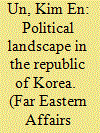

|
|
|
|
|
| Publication |
2014.
|
| Summary/Abstract |
The parliamentary and presidential elections held in the republic of Korea in 2012 led to a significant realignment of political forces in the country. The neoconservatives suffered a heavy defeat, and the opposition rallied its forces, if even for a while. The inauguration of the new president set off gradual reforms in the economy and social services. The new political landscape is also influencing the relations between the two Koreas, already showing signs of a breakthrough.
|
|
|
|
|
|
|
|
|
|
|
|
|
|
|
|
| 11 |
ID:
141457
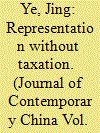

|
|
|
|
|
| Summary/Abstract |
The question of why some authoritarian regimes choose to incorporate institutions of democracy such as village elections into their governing systems remains largely unanswered. As a typical case of a resilient authoritarian state that implements democracy in its villages, China has provided an invaluable case for researchers to study. Current theories focus on the influence of political elites and rural forces separately. Insightful as they are, these theories are invalid as an explanation of the variation of local governance in China across time and thus are incomplete. It should be recognized that central fiscal strategies have great effects on local governance. Specifically, if the central government largely relies upon fiscal revenue from rural areas, it has to expand its bureaucracy to the countryside to extract revenue. In contrast, if it does not rely on the rural areas for revenue, the central government will establish local democracy in the countryside. This hypothesis is historically reflected in the authoritarian regimes led by the Nationalist Party (KMT) and Chinese Communist Party (CCP) in China. As opposed to the familiar story about representation through taxation, the logic of representation without taxation seems to be the case in China.
|
|
|
|
|
|
|
|
|
|
|
|
|
|
|
|
| 12 |
ID:
129446
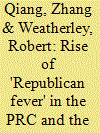

|
|
|
|
|
| Publication |
2013.
|
| Summary/Abstract |
This article examines the upsurge in Chinese public support for the legacy of the Republican era, a phenomenon known as 'Republican fever'. The fever has arisen following the formal relaxation of restrictions on discussing the Republican period. The rationale for doing so is linked to political expediency and in particular to the CCP's quest for nationalist legitimacy. By acknowledging the positive aspects of the Republican era as part of a placatory policy on reunification with Taiwan, the CCP is trying to present itself as a key partner in a united patriotic front with the Kuomintang. But things have not turned out as planned. As Republican fever has spread across a diverse section of Chinese society, so too has criticism of the CCP's record in power. In light of this, we argue that instead of fortifying the Party's nationalist legitimacy, the CCP has unwittingly started a process which appears to be eroding that legitimacy.
|
|
|
|
|
|
|
|
|
|
|
|
|
|
|
|
| 13 |
ID:
128257
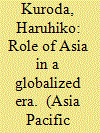

|
|
|
|
|
| Publication |
2013.
|
| Summary/Abstract |
This article first reviews the past 25 years, during which the international political situation as well as international economics and finance underwent major structural changes. It then focuses on Asia, which has recorded remarkable growth and strengthened its financial architecture since the Asian currency crisis. Issues facing Asia are detailed, together with recommendations for Asia's participation in a new international economic order.
|
|
|
|
|
|
|
|
|
|
|
|
|
|
|
|
| 14 |
ID:
124597


|
|
|
|
|
| Publication |
2013.
|
| Summary/Abstract |
The adoption of international norms by a state depends on the active support of decision makers in key gatekeeping positions. Yet, political change does not inevitably follow the initiatives of norm entrepreneurs. The literature on norm dynamics has largely focused on successful norm change. This focus on cases that support the notion that norms matter constitutes selection on the dependent variable. To more fully grasp the role and limits of gatekeepers, it is important to also investigate cases where political resistance prevented the domestic adoption of international norms. This study uses an illustrative case study in which circumstances appeared ripe for a new policy direction but where change failed to materialize. The study concludes that gatekeepers matter, but also that norm change crucially, depends not only on gatekeepers' ability to frame norms in terms that resonate domestically but also on their ability to build coalitions with other relevant political actors.
|
|
|
|
|
|
|
|
|
|
|
|
|
|
|
|
| 15 |
ID:
128217
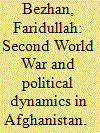

|
|
|
|
|
| Publication |
2014.
|
| Summary/Abstract |
This paper explores how the Second World War brought a new breadth to Afghanistani politics despite the fact that the country did not participate in the war. It widened the power struggle between members of the royal family and introduced new players to the scene who, by fighting for their own interests, shaped the course of events. The paper looks at the main political issues which caused division within the ruling class, mobilized the educated classes, and shaped Afghanistani politics. It also examines those players who brought about the new political developments.
|
|
|
|
|
|
|
|
|
|
|
|
|
|
|
|
| 16 |
ID:
126632
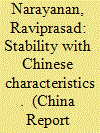

|
|
|
|
|
| Publication |
2013.
|
| Summary/Abstract |
Even as Xi Jinping begins to make his personal imprint on Cross-Strait relations, he has to contend with his predecessor, Hu Jintao's policy towards Taiwan that generated a modus vivendi, acting as a precursor to a slew of trade related agreements between the two sides leading to the ECFA in 2010. On Taiwan, the 'status quo' aspect of Cross-Strait relations has assumed overwhelming consensus with calls for deeper economic engagement with the mainland. Broadly, a template with its own characteristics emerges of a selective reconciling of differences with certain accommodations of interests making the Cross-Strait relations a unique model. This article situates Cross-Strait relations during Hu Jintao's term from 2002-2012, and advances the proposition that the mechanics of an eventual integration are underway with deeper economic cooperation being the first phase of a comprehensive framework under construction. To Beijing, its behaviour on Cross-Strait issues is intrinsic to its announced process of 'peaceful development'. However, the 'relative' success of the on-going process of economic integration does not have to be interpreted as an overwhelming endorsement of the methodology adopted, since closer relations with the mainland is a deeply divisive and politically charged issue in Taiwan
|
|
|
|
|
|
|
|
|
|
|
|
|
|
|
|
| 17 |
ID:
128219
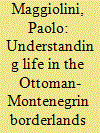

|
|
|
|
|
| Publication |
2014.
|
| Summary/Abstract |
The paper reconsiders the development of decentralization/centralization dynamics during the Ottoman Empire, focusing on the Ottoman-Montenegrin borderlands of Northern Albania with particular reference to the Mirdite territory inhabited by Catholic tribes. First, the paper describes the local socio-political system and balance of power in Mirdite territory before the enactment of the Gulhane decree. Secondly, the paper focuses on the developments and changes occurring in this land during the Tanzimat. Interaction, intertwining and overlapping between different strategies and policies are analysed in regard to the relationship between Catholic tribes, missionaries and Ottoman officials. Because of them, the changes and developments in the local administrative system occurring in both the religious and the political dimensions during the last part of the nineteenth century were expressions of the process of decentralization/centralization triggered by Istanbul from the third decade of the nineteenth century on.
|
|
|
|
|
|
|
|
|
|
|
|
|
|
|
|
|
|
|
|
|